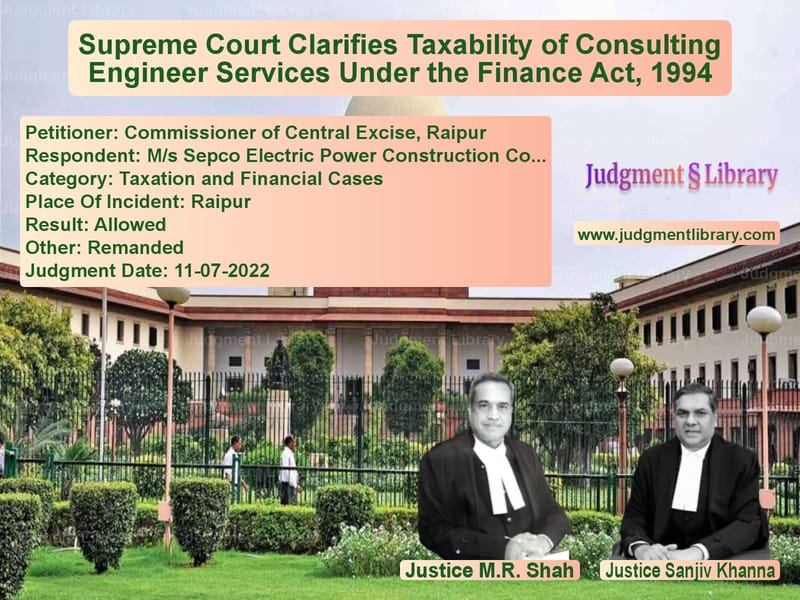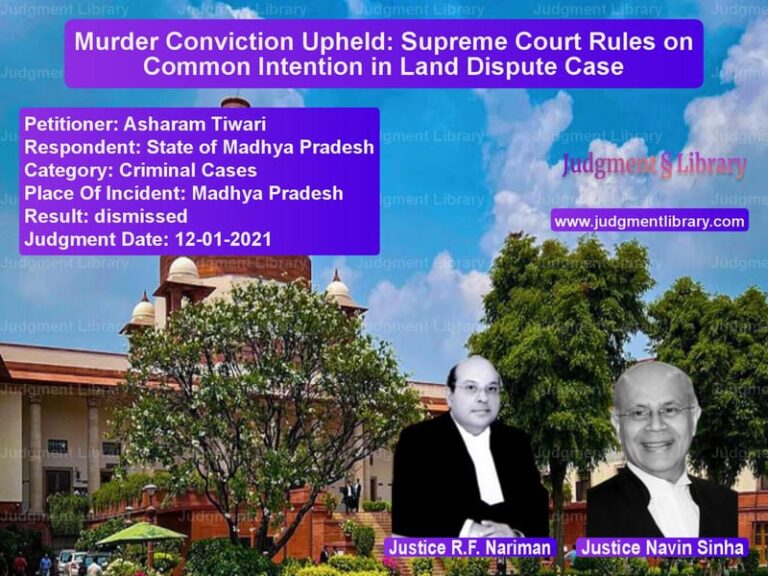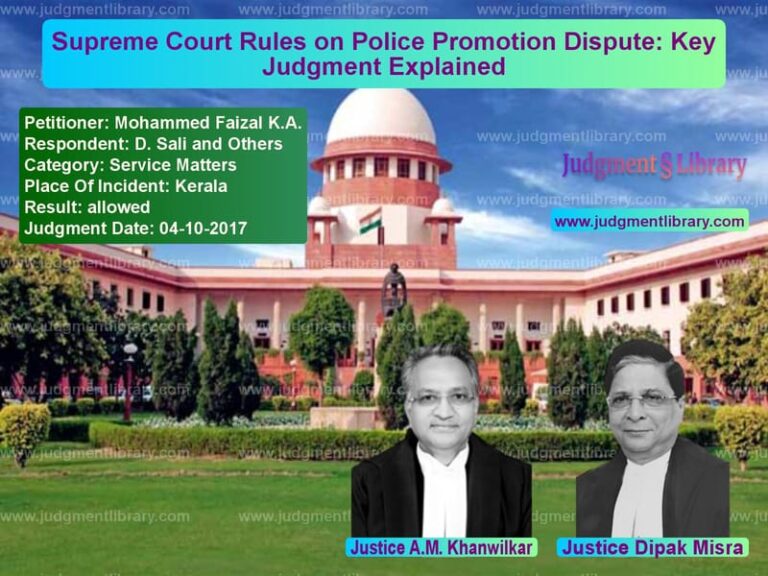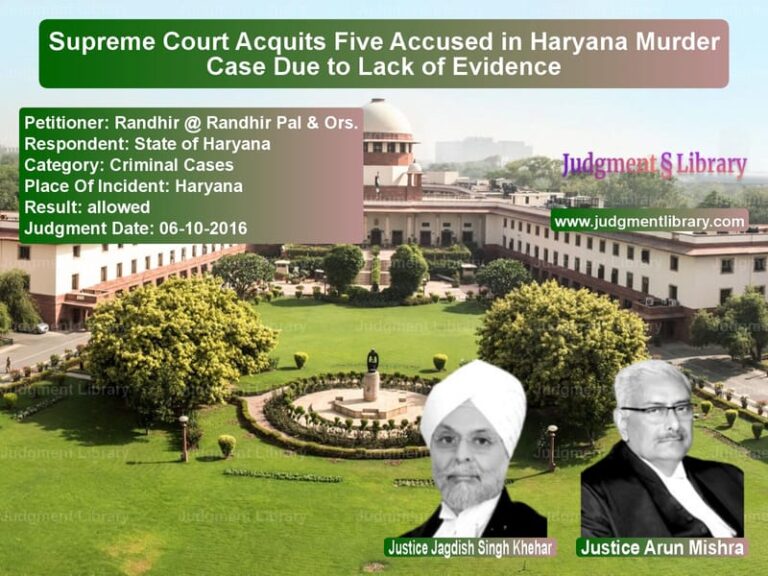Supreme Court Clarifies Taxability of Consulting Engineer Services Under the Finance Act, 1994
The Supreme Court of India, in the case of Commissioner of Central Excise, Raipur vs. M/s Sepco Electric Power Construction Corporation, provided a crucial interpretation on the taxability of consulting engineer services provided by corporate entities under the Finance Act, 1994. The Court ruled that corporate bodies engaged in engineering consultancy services were liable to pay service tax even before the 2005 amendment, which explicitly included ‘body corporates’ in the definition of ‘Consulting Engineer.’
The judgment settles a long-standing ambiguity regarding whether the original definition of ‘Consulting Engineer’ under Section 65(31) of the Finance Act, 1994, was limited to individuals and firms or if it also covered corporate entities before the amendment.
Background of the Case
The dispute arose when M/s Sepco Electric Power Construction Corporation, a Chinese company, contested the service tax demand imposed by the Commissioner of Central Excise, Raipur. The company argued that it was not liable to pay service tax on engineering consultancy services rendered in India before the 2005 amendment. The Customs, Excise & Service Tax Appellate Tribunal (CESTAT) ruled in favor of Sepco, holding that the pre-amendment definition did not include corporate bodies.
The Revenue Department challenged the CESTAT ruling in the Supreme Court, arguing that the legislative intent was always to include corporate entities and that the amendment merely clarified the existing position rather than introducing a new tax liability.
Key Legal Issues
- Whether corporate entities were liable to pay service tax under ‘Consulting Engineer’ services before the 2005 amendment.
- Whether the 2005 amendment was clarificatory or substantive in nature.
- Whether tax laws should be interpreted strictly or purposively in cases of statutory ambiguity.
Petitioner’s (Revenue Department) Arguments:
- The term ‘person’ used in the Finance Act, 1994, should be interpreted in accordance with the General Clauses Act, 1897, which includes corporate bodies.
- Exempting companies from service tax liability before 2005 would create an artificial distinction between individual engineers and engineering companies.
- Judicial precedents, including Tata Consultancy Services v. Union of India and M.N. Dastur v. Union of India, established that companies providing consultancy services were taxable.
- The 2005 amendment was merely clarificatory and intended to remove doubts rather than introduce a new tax liability.
Respondent’s (M/s Sepco Electric Power Construction Corporation) Arguments:
- The Finance Act, 1994, as originally enacted, did not expressly include corporate entities under ‘Consulting Engineer’ services.
- The legislature’s decision to amend the law in 2005 indicated that corporate entities were not previously covered.
- Tax statutes should be interpreted strictly, and any ambiguity should be resolved in favor of the taxpayer.
- Reliance was placed on past judgments where courts ruled that retrospective tax liabilities should not be imposed without explicit statutory provisions.
Supreme Court’s Observations and Ruling
The Supreme Court ruled in favor of the Revenue Department, overturning the CESTAT decision and holding that corporate entities were liable to pay service tax on consulting engineering services even before the 2005 amendment.
Key observations of the Court:
- The Finance Act, 1994, used the term ‘person’ in multiple sections, and as per the General Clauses Act, a ‘person’ includes corporate bodies.
- Legislative intent was always to tax consulting engineer services regardless of the legal structure of the service provider.
- Exempting corporate entities from tax liability would create an unjustifiable advantage over individual engineers and partnerships.
- The 2005 amendment was introduced to remove doubts and should be treated as clarificatory rather than substantive.
The Supreme Court stated:
“A purposive interpretation must be given to tax statutes where legislative intent is clear. The amendment in 2005 only clarified what was always meant to be included under the original definition.”
Accordingly, the Court remanded the matter to the CESTAT for further proceedings on related issues.
Key Takeaways from the Judgment
- Corporate bodies providing consulting engineer services were liable to pay service tax even before the 2005 amendment.
- Ambiguities in tax laws must be resolved by considering legislative intent rather than a narrow literal interpretation.
- Exempting corporate entities from service tax liability before 2005 would have led to an anomalous situation.
- Judicial precedents must be interpreted consistently to maintain uniformity in tax administration.
Impact of the Judgment
- This ruling sets a precedent that clarificatory amendments can have retrospective application.
- Tax authorities may use this ruling to justify assessments on similar cases where statutory language was later clarified.
- Corporate entities engaged in consulting services should review their past service tax compliance to avoid potential disputes.
- Strengthens the Revenue Department’s position in tax disputes involving ambiguous statutory language.
Conclusion
The Supreme Court’s ruling in this case settles the long-standing debate on the taxability of corporate entities providing consulting engineering services before 2005. By interpreting the law in line with legislative intent, the Court has reinforced the principle that tax statutes should not be interpreted in isolation but within the broader context of policy objectives. This decision will serve as a crucial reference point in future tax disputes involving similar statutory ambiguities.
Petitioner Name: Commissioner of Central Excise, Raipur.Respondent Name: M/s Sepco Electric Power Construction Corporation.Judgment By: Justice M.R. Shah, Justice Sanjiv Khanna.Place Of Incident: Raipur.Judgment Date: 11-07-2022.
Don’t miss out on the full details! Download the complete judgment in PDF format below and gain valuable insights instantly!
Download Judgment: commissioner-of-cent-vs-ms-sepco-electric-p-supreme-court-of-india-judgment-dated-11-07-2022.pdf
Directly Download Judgment: Directly download this Judgment
See all petitions in Income Tax Disputes
See all petitions in GST Law
See all petitions in Tax Evasion Cases
See all petitions in Banking Regulations
See all petitions in Tax Refund Disputes
See all petitions in Judgment by Mukeshkumar Rasikbhai Shah
See all petitions in Judgment by Sanjiv Khanna
See all petitions in allowed
See all petitions in Remanded
See all petitions in supreme court of India judgments July 2022
See all petitions in 2022 judgments
See all posts in Taxation and Financial Cases Category
See all allowed petitions in Taxation and Financial Cases Category
See all Dismissed petitions in Taxation and Financial Cases Category
See all partially allowed petitions in Taxation and Financial Cases Category







